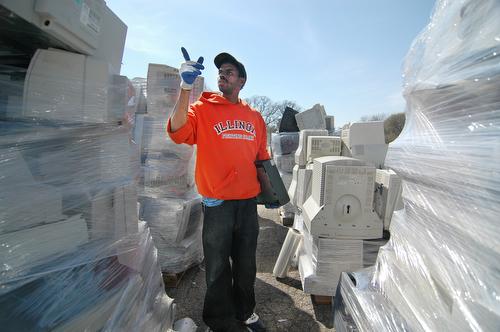UI looks into electronics recycling plan

Muhammad Malik of Chicago navigates the forest of piled computers and monitors at the Champaign County Computer/Electronics Recycling Event at 1500 E. Main St., in Urbana on Saturday. “I think scanners are over there,” he said. Beck Diefenbach
April 26, 2007
The University of California system is the first in the nation to set guidelines for the purchasing of electronics and recycling of electronic waste as part of a larger sustainability policy, according to a policy statement released on March 22.
The policy includes benchmarks for recycling, green building design and efficient energy practices. The policy covers all 10 schools in the state’s public system.
Tim Hoss, coordinator of Campus Waste Management, said the University does not currently have a formal policy for recycling electronics, but it has developed an informal plan for the materials.
The University recycles electronics with Mack’s Twin City Recycling, 2808 N. Lincoln Ave. in Urbana. Mack’s disassembles the electronics they receive and resells the parts.
Get The Daily Illini in your inbox!
Jim Puckett, coordinator of Basel Action Network, an organization focused on stopping the shipment of electronic waste to poor countries, said that it would be great if Illinois campuses adopted a policy similar to California’s.
Students at the universities in California under this policy played a large role in instituting the requirements.
According to an April 4 press release from the Environmental News Service, the Silicon Valley Toxics Coalition sponsored a Toxic Free University of California campaign, operated by the students. The university responded to the campaign after about a year.
“The University of California is pleased to take part in this important effort to safeguard the environment,” said Robert Dynes, president of the University of California, in the release. “As a public research university, we have an obligation to continue our leadership role in the area of environmental stewardship.”
Under the guidelines for electronics, the University of California’s campuses will only use computers that have achieved a Bronze rating under the Electronic Products Environmental Assessment Tool, a system that helps consumers identify environmentally friendly computers. The Assessment’s Web site explains the rating of products. A Bronze rating means that all criteria required for basic certification are met. There are 23 requirements to be met to garner a Bronze rating. Products with Silver and Gold ratings go a step further by satisfying optional criteria.
The University of California will also require its recyclers to have signed the Electronics Recycler’s Pledge of True Stewardship, pledging not to ship electronics to developing nations.
Puckett said any recycling sites that have not signed the pledge may be exporting received electronics. He said even if a site does not export their electronics, they may transfer them to other sites that do.
Mack’s Recycling is currently not listed as having signed the pledge, but Ken Mathis, president of the company, said Mack’s does not sell electronics to sites outside the U.S.
He said national legislation to stop the transport of electronics to poor countries would involve recording every transaction as electronics are recycled. Electronics are transferred from site to site for recycling.
“That’s not fair at all,” Mathis said. “They’re asking me to share those market secrets that I’ve found with them.”
Mathis said this type of legislation may detract consumers from recycling.
“(Recycling sites) have to be profitable,” Mathis said. “If it’s not profitable, you have to charge a fee. That determines the volume consumers bring to you.”






